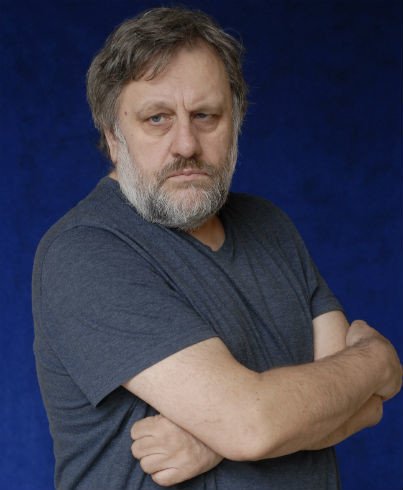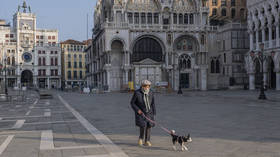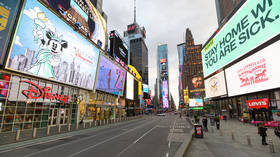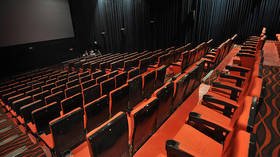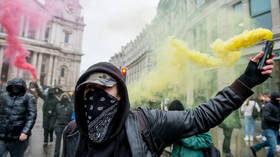Slavoj Zizek’s Covid-19 lockdown survival guide: Guilty pleasures, Valhalla Murders & pretending it's just a game
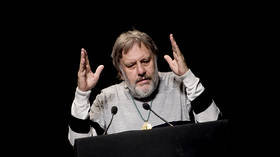
To deal with the mental pressure during the coronavirus pandemic, my first rule is it’s not a time to search for spiritual authenticity. Without any shame – assume all small rituals that stabilize your daily life.
Let me begin by a personal confession: I like the idea of being confined to one’s apartment, with all the time to read and work.
Even when I travel, I prefer to stay in a nice hotel room and ignore all famous attractions. A good essay on a famous painting means much more to me than seeing this painting in a crowded museum. But I noticed this makes it worse, not easier, for being now obliged to confinement. Why?
Let me repeat the famous joke from Ernst Lubitsch’s Ninotchka: “‘Waiter! A cup of coffee without cream, please!’ ‘I’m sorry, sir, we have no cream, only milk, so can it be a coffee without milk?’”
At the factual level, coffee remains the same coffee, but what we can change is to make the coffee without cream into a coffee without milk – or, even simpler – to add the implied negation and to make the plain coffee into a coffee without milk.
Is this not what happened with my isolation? Prior to the crisis, it was an isolation “without milk” – I could have gone out, I just chose not to. Now it’s just the plain coffee of isolation with no possible negation implied.
Invisible threats are most terrifying
My friend Gabriel Tupinamba, a Lacanian psychoanalyst who works in Rio de Janeiro, explained this paradox to me in an email message: “People who already worked from home are the ones who are the most anxious, and exposed to the worst fantasies of impotence, since not even a change in their habits is delimiting the singularity of this situation in their daily lives.”
His point is complex but clear: if there is no great change in our daily reality, then the threat is experienced as a spectral fantasy nowhere to be seen and all the more powerful for that reason. Remember that, in Nazi Germany, anti-Semitism was strongest in those parts where the number of Jews was minimal – their invisibility made them a terrifying specter.
Tupinamba further noticed that the same paradox held for the outburst of the HIV crisis: “the invisible spread of the HIV crisis was so nerve-wracking, the impossibility of rendering ourselves commensurate with the scale of the problem, that having one’s passport ‘stamped’ /with HIV/ did not seem, to some, like too high a price to pay for giving the situation some symbolic contours. It would at least give a measure to the power of the virus and deliver us to a situation in which, already having contracted it, we could then see what sort of freedom we would still have.”
The moment the spectral agent becomes part of our reality (even if it means catching a virus), its power is localized, it becomes something we can deal with (even if we lose the battle). As long as this transposition into reality cannot take place, “we get trapped either in anxious paranoia (pure globality) or resort to ineffective symbolisations through acting outs that expose us to unnecessary risks (pure locality).”
These “ineffective symbolizations” already assumed many forms – the best known of them is US President Donald Trump’s call to ignore the risks and get America back to work. Such acts are much worse than shouting and clapping while watching a soccer match in front of your home TV, acting like you can magically influence the outcome. But this does not mean we are helpless: we can get out of this deadlock before science will provide the technical means to constrain the virus.
Also on rt.com The working class should be hailed as Covid-19 heroes for enabling all our comfy quarantinesHow not to give in to paranoia
Here is what Tupinamba says: “The fact that doctors who are in the frontline of the pandemic, people creating mutual aid systems in peripheral communities, etc., are less likely to give in to crazy paranoias, suggests to me that there is a ‘collateral’ subjective benefit to certain forms of political work today. It seems that politics done through certain mediations – and the State is often the only available means here, but I think this might be contingent – not only provides us with the means to change the situation, but also to give the proper form to the things we have lost.”
In the UK, more than 400,000 young healthy people volunteered to help those in need – a good step in this direction.
How to avoid mental breakdown
So what about those among us who are not able to engage ourselves in this way – what can we do to survive the mental pressure of living in a time of pandemics? My first rule here is: this is not the time to search for some spiritual authenticity, to confront the ultimate abyss of our being. Without any shame – assume all small rituals, formulas, quirks, etc. that stabilize your daily life.
Everything that may work is permitted here to avoid a mental breakdown. Don’t think too much in long terms – think of today, what you will be doing till sleep. If it works, play the game of Life is Beautiful (the movie): pretend the lockdown is just a game in which you and your family freely participate with the prospect of a big reward if you win. And, if we are with movies (if you have some free time for them), gladly succumb to all your guilty pleasures: catastrophic dystopias, daily life TV comedy series with canned laughter like Will and Grace, YouTube podcasts on the great battles of the past. My preferences are dark Scandinavian – preferably Icelandic – crime series like Trapped or Valhalla Murders.
However, this stance doesn’t reach all the way – the main task is to structure your daily life in a stable and meaningful way. Here is how another of my friends, Andreas Rosenfelder, a German journalist from Die Welt, described in an email to me the new stance towards daily life that is emerging: “I really can feel something heroic about this new ethics, also in journalism – everybody works day and night from home office, making video conferences and taking care of children or schooling them at the same time, but nobody asks why he or she is doing it, because it’s not any more ‘I get money and can go to vacation etc.’, since nobody knows if there will be vacations again and if there will be money. It’s the idea of a world where you have a flat, basics like food etc., the love of others and a task that really matters, now more than ever. The idea that one needs ‘more’ seems unreal now.”
I cannot imagine a better description of what one should shamelessly call a non-alienated decent life – and I hope that some of this stance will survive when the pandemics will hopefully pass.
Think your friends would be interested? Share this story!
The statements, views and opinions expressed in this column are solely those of the author and do not necessarily represent those of RT.
